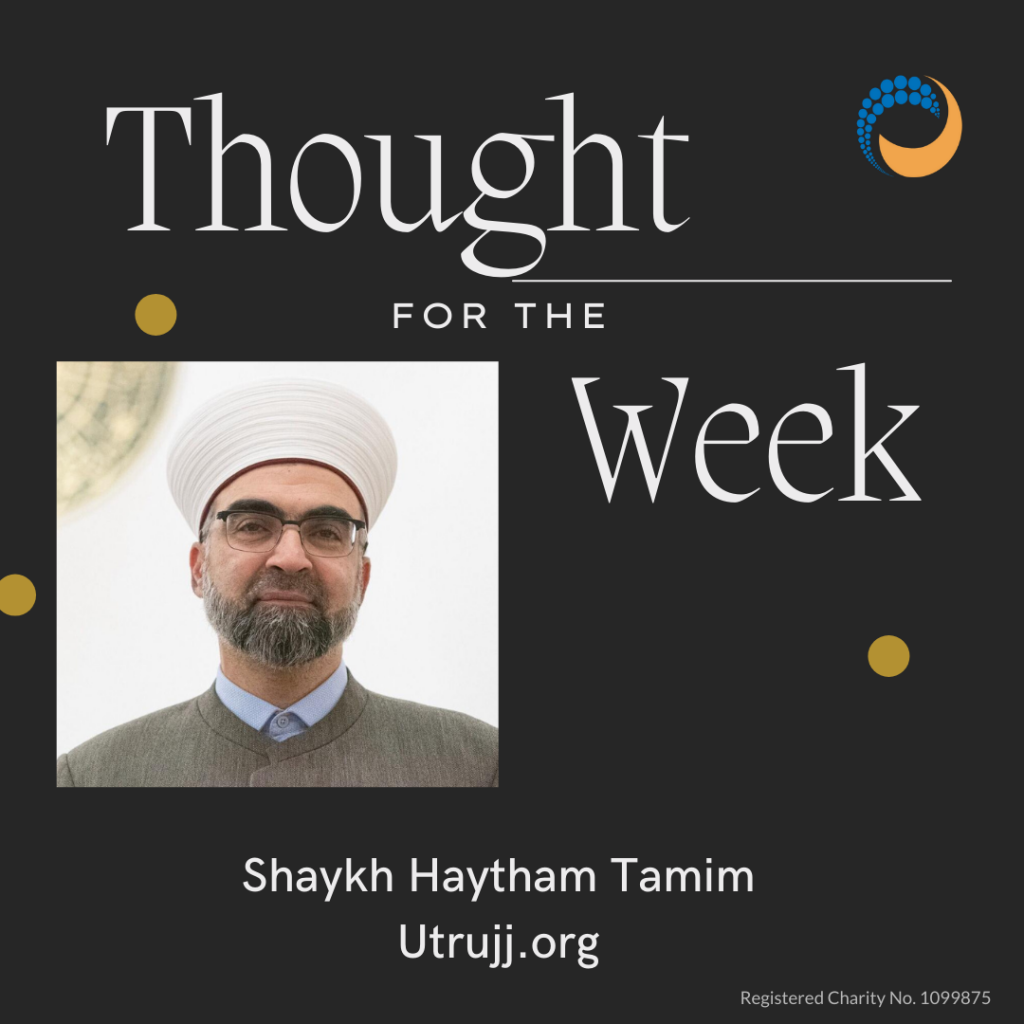Three ways to elevate yourself

Race to goodness
In the Qur’an, Allah Almighty mentions the importance of doing good in many verses. In Surat ul Hajj, Allah Almighty says waf’alul-khayr:
يَا أَيُّهَا الَّذِينَ آمَنُوا ارْكَعُوا وَاسْجُدُوا وَاعْبُدُوا رَبَّكُمْ وَافْعَلُوا الْخَيْرَ لَعَلَّكُمْ تُفْلِحُونَ ۩
O you who believe! Kneel, and prostrate, and worship your Lord, and do good deeds, so that you may succeed. [22:77]
In Surat al Baqarah, Allah Almighty says fa sabiqunal khayr:
وَلِكُلٍّ وِجْهَةٌ هُوَ مُوَلِّيهَا ۖ فَاسْتَبِقُوا الْخَيْرَاتِ ۚ أَيْنَ مَا تَكُونُوا يَأْتِ بِكُمُ اللَّهُ جَمِيعًا ۚ إِنَّ اللَّهَ عَلَىٰ كُلِّ شَيْءٍ قَدِيرٌ
To every community is a direction towards which it turns. Therefore, race towards goodness. Wherever you may be, God will bring you all together. God is capable of everything. [2:148]
Therefore we are not just being told to spread goodness, but race to do it.
Do good in all situations
In another verse, Allah Almighty says:
وَلَا تَسْتَوِي الْحَسَنَةُ وَلَا السَّيِّئَةُ ۚ ادْفَعْ بِالَّتِي هِيَ أَحْسَنُ فَإِذَا الَّذِي بَيْنَكَ وَبَيْنَهُ عَدَاوَةٌ كَأَنَّهُ وَلِيٌّ حَمِيمٌ
“Good and evil are not equal. Repel evil with what is good. And the person who was your enemy becomes like an intimate friend.” [41:34]
Allah Almighty is telling us through all these verses that we have to respond with goodness respond with goodness regardless of the circumstances.
وَمَا يُلَقَّاهَا إِلَّا الَّذِينَ صَبَرُوا وَمَا يُلَقَّاهَا إِلَّا ذُو حَظٍّ عَظِيمٍ
“But none will attain it except those who persevere, and none will attain it except the very fortunate.” [41:35]
The Prophet (peace be upon him) confirmed this command in his own actions, and repeated it in his speeches and sermons. One of these beautiful narrations in the Sunnah of the Prophet (peace be upon him), teaches us that there are two ways in which we can spread good: generally – everywhere and to everybody, and specifically – to our families.
Be good to your family
`Abdullah bin `Amr (may Allah be pleased with him) narrated that the Prophet ﷺ said:
عَنْ عَبْدِ اللَّهِ بْنِ عَمْرٍو عَنِ النَّبِيِّ صلى الله عليه وسلم قَالَ “ لَيْسَ الْوَاصِلُ بِالْمُكَافِئِ،، وَلَكِنِ الْوَاصِلُ الَّذِي إِذَا قَطَعَتْ رَحِمُهُ وَصَلَهَا ”.البخاري.
The one who maintains a relationship with his relatives only because they maintain a relationship with him is not truly upholding the ties of kinship. The one who truly upholds those ties is the one who does so even if they break off the relationship.” [Bukhari]
Abu Hurayrah (may Allah be pleased with him) reported that a person said:
عَنْ أَبِي، هُرَيْرَةَ أَنَّ رَجُلاً، قَالَ يَا رَسُولَ اللَّهِ إِنَّ لِي قَرَابَةً أَصِلُهُمْ وَيَقْطَعُونِي وَأُحْسِنُ إِلَيْهِمْ وَيُسِيئُونَ إِلَىَّ وَأَحْلُمُ عَنْهُمْ وَيَجْهَلُونَ عَلَىَّ . فَقَالَ “ لَئِنْ كُنْتَ كَمَا قُلْتَ فَكَأَنَّمَا تُسِفُّهُمُ الْمَلَّ وَلاَ يَزَالُ مَعَكَ مِنَ اللَّهِ ظَهِيرٌ عَلَيْهِمْ مَا دُمْتَ عَلَى ذَلِكَ ” .مسلم.
Allah’s Messenger, I have relatives with whom I try, to have close relationship, but they sever (this relation). I treat them well, but they treat me ill. I am sweet to them but they are harsh towards me. Upon this he (the Holy Prophet) said: If it is so as you say, then you in fact throw hot ashes (upon their faces) and there would always remain with you on behalf of Allah (an angel to support you) who would keep you dominant over them so long as you adhere to this (path of righteousness). [Muslim]
Anas bin Malik (may Allah be pleased with him) narrated Allah ‘s Messenger (peace be upon him) said:
عن أَنَس بْن مَالِكٍ، أَنَّ رَسُولَ اللَّهِ صلى الله عليه وسلم قَالَ “ مَنْ أَحَبَّ أَنْ يُبْسَطَ لَهُ فِي رِزْقِهِ، وَيُنْسَأَ لَهُ فِي أَثَرِهِ، فَلْيَصِلْ رَحِمَهُ ”. رواه البخاري.
“Whoever would like his rizq (provision) to be increased and his life to be extended, should uphold the ties of kinship.” [Bukhari]
Be good to all
In the general sphere, the Prophet (peace be upon him) was addressing the companion ‘Uqbah bin ‘Amir, one of the young companions in Madinah, who was among the very first people in Madinah to embrace Islam. The Prophet (peace be upon him) said to him:
عَنْ عُقْبَةَ بْنِ عَامِرٍ قَالَ : لَقِيتُ رَسُولَ اللَّهِ صَلَّى اللَّهُ عَلَيْهِ وَسَلَّمَ، فَقَالَ لِي : ” يَا عُقْبَةَ بْنَ عَامِرٍ، صِلْ مَنْ قَطَعَكَ، وَأَعْطِ مَنْ حَرَمَكَ، وَاعْفُ عَمَّنْ ظَلَمَكَ “. “.رواه أحمد.
‘Uqbah ibn ‘Amir (may Allah be pleased with him) reported:
عَنْ عُقْبَةَ بْنِ عَامِرٍ قَالَ : لَقِيتُ رَسُولَ اللَّهِ صَلَّى اللَّهُ عَلَيْهِ وَسَلَّمَ، فَقَالَ لِي : ” يَا عُقْبَةَ بْنَ عَامِرٍ، صِلْ مَنْ قَطَعَكَ، وَأَعْطِ مَنْ حَرَمَكَ، وَاعْفُ عَمَّنْ ظَلَمَكَ “. “.رواه أحمد.
I met the Messenger of Allah (peace be upon him) and he said to me, “O ‘Uqbah, reconcile with whoever cuts you off, give to whomever deprives you, and forgive whoever wrongs you.” [Ahmad]
Thus the Prophet (peace be upon him) mentioned three things to ‘Uqbah. These present three challenges. The first is to “Reconcile with whoever cuts you off”. This might be a friend, a colleague, a neighbour, or a relative. And sometimes, sadly, it might even be your father or your mother, your sister or your brother. This was general advice that we need to reconcile with those who have wronged us and severed their relationship with us. We need to do our best not to respond according to our instinct. We need to elevate ourselves with imaan, not to follow our whims and desires. Otherwise we are the same as them. However, imaan makes us a different person – a person of heaven, not a person of the Earth. The more you connect yourself to heaven and the revelation, the more it lifts you up. The more you connect yourself to your whims and desires, the more it pulls you down. This is why Allah Almighty is encouraging us and giving us incentives to spread as much goodness as we can, for our sake.
1. Reconcile with those who cut you off
The Prophet (peace be upon him) was telling ‘Uqbah bin ‘Amir (may Allah be pleased with him) to reconcile with those who cut him off, which is not an easy task. But we need to strive towards doing what is good.
2. Give to those who deprive you
The second challenge is to “Give to those who deprive you”. Again, this is not easy by any means. However, entry to Jannah is not free of charge. We need to strive towards that by giving to those who deprive us.
3. Forgive those who wrong you
The third challenge is to “Forgive those who wronged you”. This is also very difficult and challenging. It is not an easy task at all. But we saw the Prophet (peace be upon him) demonstrate this beautifully and strikingly when he conquered Makkah with the 10,000 troops and addressed them. He asked them, ‘What do you think I’m going to do with you?’
The prophetic way
They had flashbacks to all the years they persecuted and tortured him, insulted him, and fought him and attempted to assassinate him. They begged for forgiveness, saying ‘You are a generous brother, you are the son of a generous brother.’ And he replied, ‘Go you are free.’ It’s the perfect example of forgiving those who wronged you. If we want to attain Jannah, we need to make sacrifices. The Prophet (peace be upon him) taught us to do good in every circumstance, and to have good relationships with our families, as well as others.
I ask Allah Almighty to enable us to follow in the footsteps of His Beloved Messenger and be among those who are spread goodness wherever they go and compete in spreading goodness. Ameen.
Khutbah Shaykh Haytham Tamim 3rd March 2023. Transcribed by Zayna Sheikh
How to deal with difficult family members
Rising prices, rising chances for reward
Public wealth and material wealth and real wealth
- How Allah strengthens the hearts of believers
- Why should you follow up one good action with another one?
- Don’t be a Ramadani person – Be a Rabbani person.
- How do you pray Salat al-Kusuf – the prayer during a solar eclipse
- The test of will – Tarawih Reflections 30

Recommended Posts

How Allah strengthens the hearts of believers
April 19, 2024

Don’t be a Ramadani person – Be a Rabbani person.
April 10, 2024

